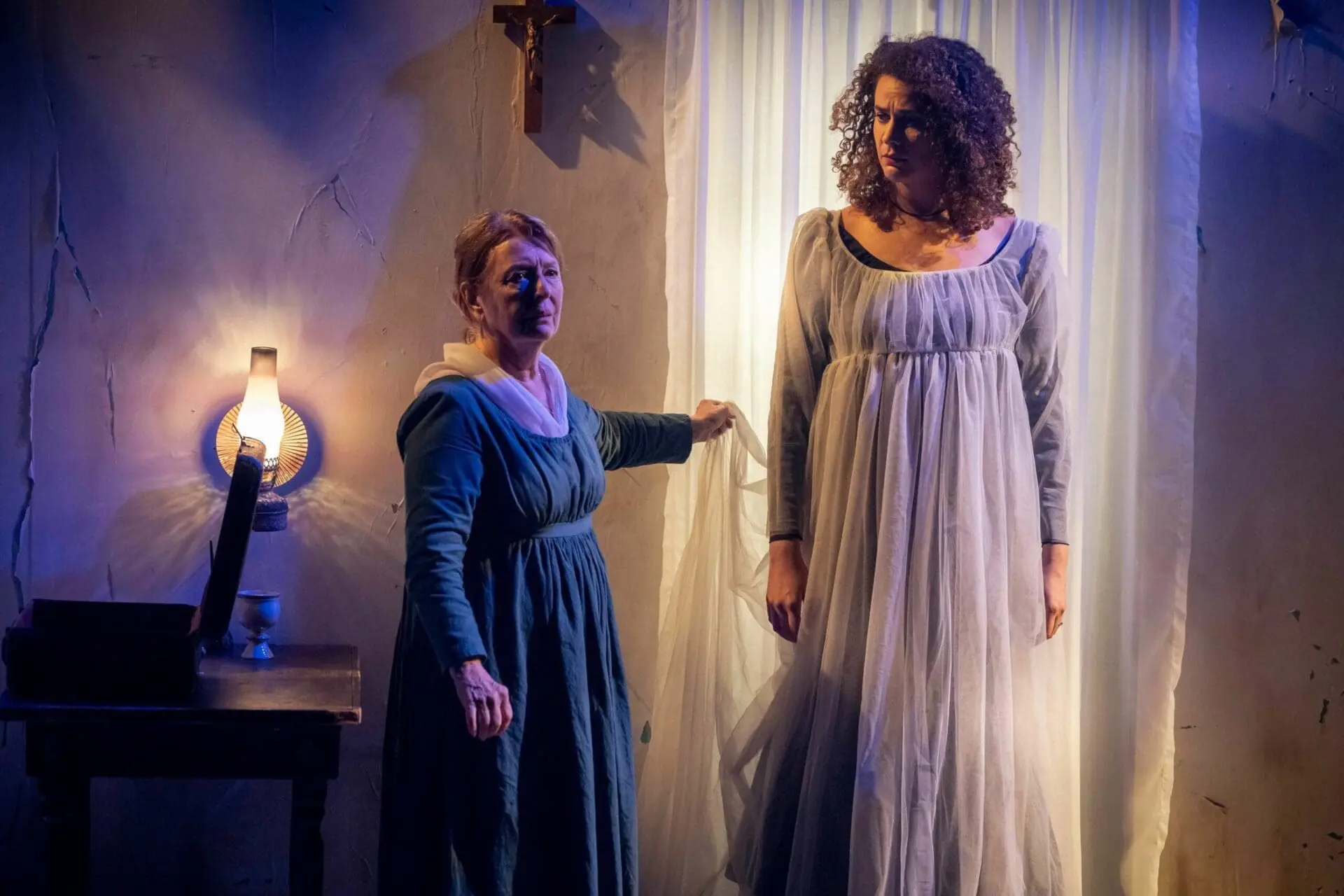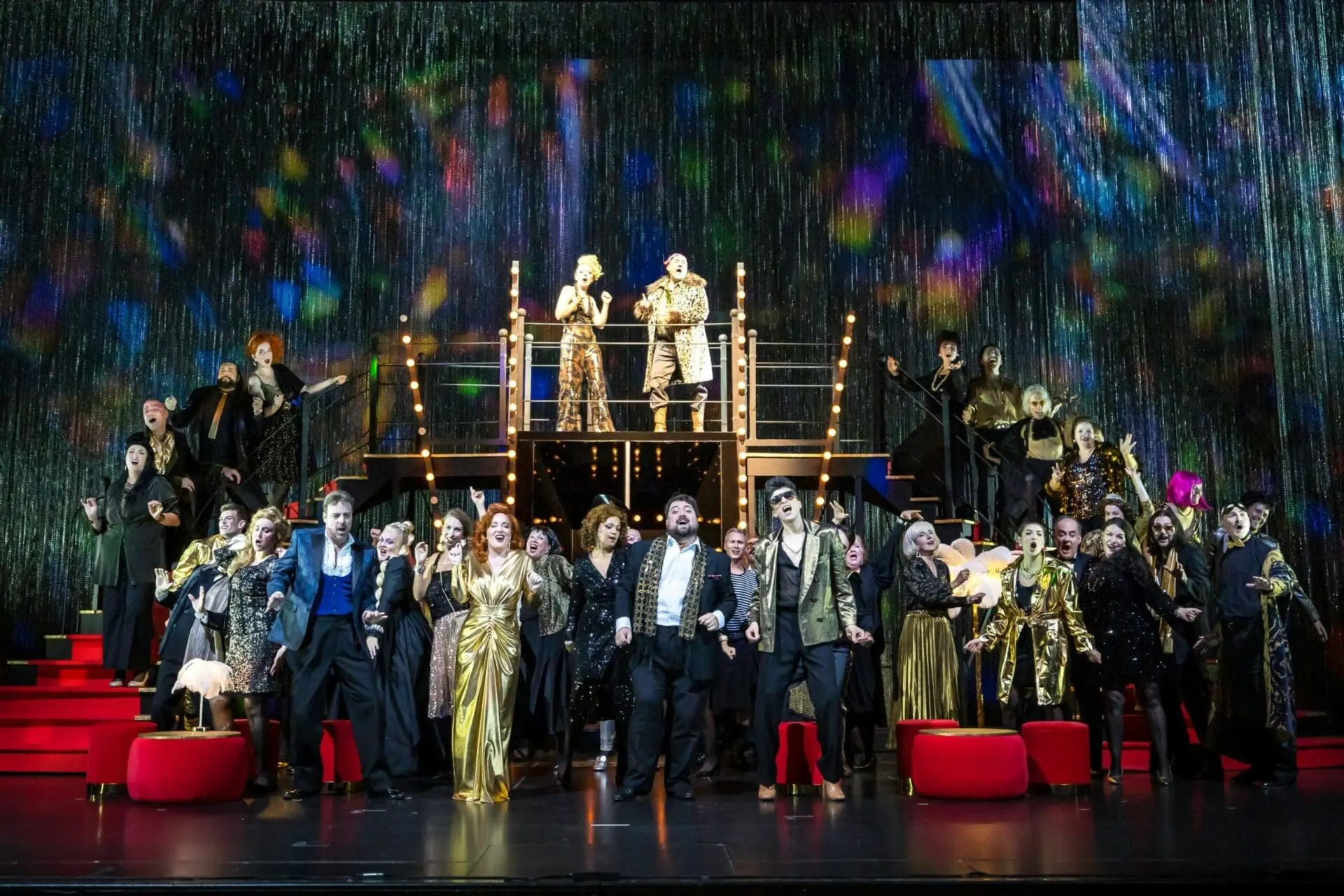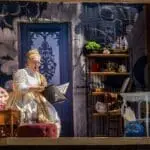The 13th Festival d’opéra de Québec, which took place from July 24 to August 4, is officially the only French-language opera festival in the world. The establishment of a major summer opera festival – in French – was a goal of General and Artistic Director Jean-François Lapointe upon his arrival at the company. The program for these 12 days included some 30 free outdoor activities, a collaboration with Jeunesses Musicales Canada (La voix humaine, reviewed here), a major concert, a new creation, a show combining theatre and opera and, to top it all off, three performances of La vie parisienne by Jacques Offenbach.
Outdoor Activities
The outdoor activities, many of which were affected by the heat wave, consisted of an “opera circuit” in front of five historic sites in Old Québec. The public walks from one “station” to another to hear short recitals presented by young singers, accompanied this year by instruments as diverse as the vibraphone, the barrel organ, the accordion and a 13-string guitar. The result was original and allowed sopranos Rose Lebeau Sabourin, Andréanne Laprise, Catherine-Élisabeth Loiselle, tenor Gabriel Provencher and bass-baritone Maxence Lasserre-Engberts to be appreciated.
The itinerant formula of the “Brigades lyriques,” which has become an opera and operetta brigade since last year, made it possible to rescue two practically unknown works from oblivion. Staged by Félix Tremblay-Therrien and with costumes by Sophie Martel, the charming operetta of Charles Lecocq‘s youth, Le baiser à la porte (1864), was sung with aplomb by Mathilde Duval-Laplante and Dominic Veilleux, accompanied by Bruce Gaulin at the piano. Jules Massenet‘s comic opera La grand’tante (1867), a work of less than an hour, was brilliantly presented by Emmanuel Hasler, Geneviève Dompierre-Smith and Azur Simard. These shows, which require only a few set pieces, would be worth touring to Francophone communities in other parts of the country.
![Circuit Opeěra 2024[44]](https://operacanada.ca/wp-content/smush-webp/2024/08/Circuit-Opeera-202444-scaled.jpg.webp)
Photo Credit: Irène Brisson
Circuit opéra with Gabriel Provencher and Sylvain Leblanc, photo: Irène Brisson
From Gluck to Berlioz
Much was expected of the great concert of French opera arias presented on July 27th at the Palais Montcalm with the Violons du Roy orchestra with French soprano Isabelle Cals and Québec tenor Frédéric Antoun. The repertoire, ranging from Gluck to Berlioz, included excerpts from Iphigénie en Aulide and Iphigénie en Tauride, Alceste’s dramatic Divinités du Styx, fragments of Cherubini’s Médée and Halévy’s La Juive, and ending with a duet from Les Troyens by Berlioz in an orchestral arrangement for some thirty musicians.
If the orchestra, reinforced by several musicians from the Orchestre symphonique de Québec and vigorously conducted by Nicolas Ellis, was up to the performance, I have some reservations on the vocal side. Isabelle Cals is scenically convincing and dramatic as can be, especially in Médée, and her range is extensive, but the voice has some intonation problems, and the high notes are strident, not to say shouted without nuance. Frédéric Antoun, whose diction is remarkable, was a little overshadowed by the flamboyant character of his partner, especially since he was suffering from torticollis. Let us salute, however, his touching and very sustained “J’ai perdu mon Eurydice” by Gluck and his performance of “Rachel, quand du Seigneur” from La Juive.
A World Première
In 2021 and 2022, pianist and composer Jean-François Mailloux and librettist Jean-Philippe Lavoie successfully premiered children’s operas at the Festival d’opéra de Québec: Donkey Skin and Andersen’s Three Tales. They did it again this summer with another world premiere, The Ugly Duckling, from the story by Hans-Christian Andersen. This new work featured four singers, a narrator and a small instrumental ensemble.
Both children and adults had reason to marvel and be moved by the quality of the music, which drew on several styles, and by the performances of singers Carole-Anne Roussel, Marie-Andrée Mathieu (as the ugly duckling), Élisabeth Veilleux and Louis-Charles Gagnon, who were both funny and touching. We should also note the beauty of the costumes made by Sophie Martel and Elena Stupa and the video projections created by Xin Ting Zhou.
The Sufferings of a Mother
One of the highlights of the Festival was the presentation, at the Théâtre du Périscope, of Epitaph de Carmen et son assassin by Québec writer France Ducasse. This work, premiered at the Palais Montcalm in 2017, had not been performed since, so it became a happy rediscovery for the public. Epitaph de Carmen is a play that gives voice to the mother of Don José, sentenced to death for killing Carmen.
José’s mother, who is angry, despairing and in need of understanding, tries to reconstruct the thread of events that faced her son. She is haunted by Carmen, the cause of her
misfortune. Between her monologues, rendered with passion and intensity by the remarkable actress Marie-Ginette Guay, we hear arias from Bizet’s Carmen, superbly sung by contralto Rose Naggar-Tremblay, accompanied on the piano by Marie-Hélène Greffard.

Photo Credit : Jessica Latouche.
Marie-Ginette Guay and Rose Naggar-Tremblay in Epitaph de Carmen et son assassin,
A Colorful Vie Parisienne
To close, the Festival d’opéra de Québec presented La vie parisienne by Jacques Offenbach at the Grand Théâtre de Québec (August 2-4), an opera buffa that had not been seen on this stage since 2013. Sadly, it was not sold out, because everything about the performances was built to impress the eyes and the ears.
The staging by the Jean-Romain Vesperini set the action in the 1980s. The show was designed by Bruno de Lavenère, one of the collaborators in the opening ceremonies of the Paris Olympic Games – both Vesperini and de Lavenère will be back this autumn for Opéra de Québec’s production of Rossini’s Le comte Ory. The Orchestre symphonique de Québec was conducted by the young conductor Thomas Le Duc-Moreau. The music was strongly sung by French baritone Jean-Luc Ballestra (Gondremarck), by Quebecers Geoffroy Salvas and Dominique Côté (Bobinet et Gardefeu), as well as by mezzo-soprano Julie Boulianne (an incendiary Métella) and the soprano Marie-Eve Munger (Baroness de Gondremarck), not to mention the rest of the equally remarkable cast.
Related Content ↘
Opera Canada depends on the generous contributions of its supporters to bring readers outstanding, in-depth coverage of opera in Canada and beyond. Please consider subscribing or donating today.















